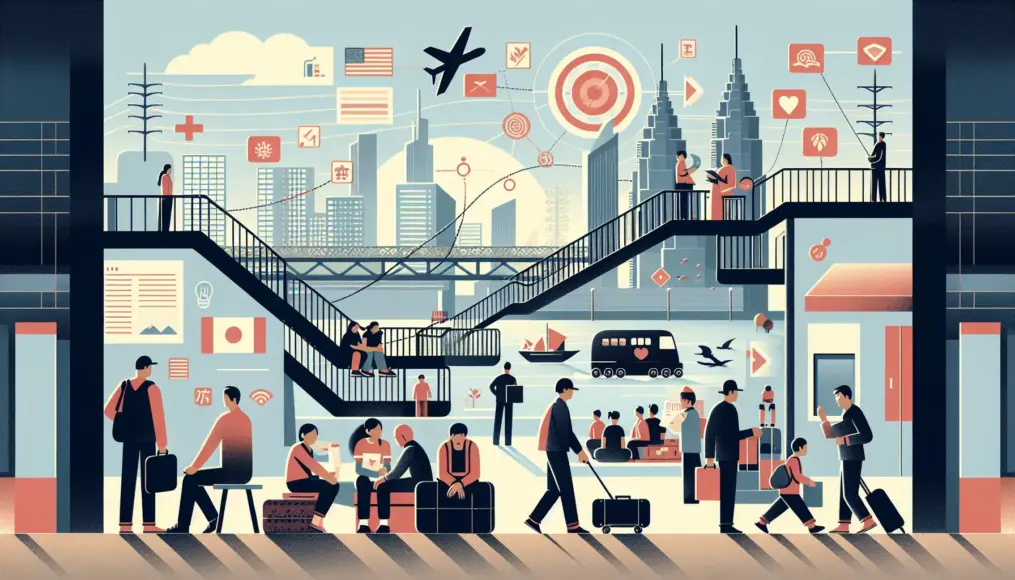Immigration has become an increasingly significant topic in today’s world. As more people cross borders to settle in new lands, we feel the effects of this phenomenon in our daily lives. Reflecting on its impact on our economy and society, along with the challenges that come with it, is essential for shaping our future.
The diversity and new economic opportunities that immigrants bring hold immense potential for our society. However, challenges also arise with their arrival. Let’s explore what these challenges are and how we can work together to address them.
In this article, we will provide a comprehensive overview of immigration, from its basic definitions and background to its implications in contemporary society and the efforts being made to find solutions. We encourage you to read on to deepen your understanding of immigration issues.
- We’ll explore the fundamental definitions and background of immigration.
- We will examine the challenges posed by immigration in modern society.
- We’ll highlight the potential benefits of welcoming immigrants.
Understanding the Basics of Immigration Issues
Immigration issues encompass a variety of challenges and impacts that arise when people move across borders to settle in other countries. These issues include economic, social, and cultural dimensions, which can vary significantly depending on the nation or region. As the number of immigrants continues to rise, we are increasingly compelled to acknowledge their effects on society.
In this section, we will first define what “immigration” means, and then explore the underlying problems and challenges associated with it. Understanding how immigrants influence society and the mechanisms behind these effects is crucial for thoughtful discussion on immigration issues.
What is Immigration?
Immigrants are individuals who relocate to another country in search of better living conditions or safety. They move for a variety of reasons and can significantly impact the culture and economy of their new homes. While immigrants contribute to the workforce and enhance cultural diversity, they can also create a range of challenges for the host country.
The factors driving immigration often include war, poverty, and natural disasters. These circumstances can compel individuals to seek new homes, sometimes leading to large-scale migrations. As the number of immigrants increases, the structure of society and the dynamics of the economy can shift, giving rise to new challenges.
- Immigrants are individuals seeking better living conditions or safety in another country
- The impacts of immigration are diverse and multifaceted
- Key factors include war, poverty, and natural disasters
The Context of Emerging Issues
When immigration increases, various problems may arise in the host country. For instance, competition in the labor market can intensify, leading to friction between local residents and newcomers. Additionally, differences in language and culture can create barriers to communication between immigrants and the local population.
Moreover, there can be backlash against immigration. Economic downturns, in particular, can exacerbate biases and discrimination against immigrants. Addressing these issues requires a collective understanding and cooperation within society as a whole.
- Increased competition in the labor market due to rising immigration
- Communication barriers stemming from language and cultural differences
- Instances of bias and discrimination against immigrants may be amplified
Challenges of Immigration Issues in Modern Society
In today’s world, immigration has a significant impact on both the economy and society. As the number of immigrants increases, changes occur in the labor market and social structures, leading to various challenges. This section will primarily explore the economic and social effects of immigration.
While the influx of immigrants can revitalize the economy, it can also intensify competition for job opportunities, resulting in friction with local residents. Additionally, differences in culture and values brought by immigrants can contribute to social divisions. Understanding these challenges is the first step toward addressing immigration issues.
Economic Impact
The economic effects of immigration are diverse. Immigrants provide new labor, which can stimulate economic growth and lead to the expansion of specific industries. However, this competition can sometimes result in lower wages or reduced job opportunities for local workers.
On the flip side, immigrants participate in the market as consumers, creating new demand and potentially benefiting the overall economy. Yet, in the short term, fears regarding the impact on local economies often increase, which can lead to social tensions.
- Immigrants provide new labor and invigorate the economy.
- Competition with local residents can lead to wage declines and fewer job opportunities.
- Immigrant spending can create new demand.
Social Impact
The rise in immigration brings cultural diversity to society, but it can also trigger social divisions and conflicts. Language and cultural differences can complicate communication between immigrants and local residents, often resulting in misunderstandings and prejudices.
Moreover, the process of accepting immigrants can spark political debates. Some individuals may harbor negative views towards immigrants, further deepening societal divisions. To address these issues, initiatives that promote mutual understanding are essential.
For those interested in immigration issues in Japan, we recommend checking out this article: “Exploring Japan’s Foreign Worker Acceptance Policies and Their Impact!”. This article provides a detailed analysis of the background and effects of foreign acceptance policies, helping to deepen your understanding of the economic and social changes brought about by immigration.
- Immigration brings cultural diversity but can also create social divisions.
- Language and cultural differences can hinder communication.
- Initiatives that promote mutual understanding are needed.
The Potential of Embracing Immigration
Welcoming immigrants goes beyond merely addressing challenges; it opens the door to a wealth of opportunities. Among the most significant benefits immigrants bring to society are the promotion of diversity and economic growth. In this section, we will explore the positive aspects of immigration and how it enriches our communities.
Immigrants come from various backgrounds and cultures, providing fresh perspectives and ideas. This influx of diversity can lead to a more adaptable and creative society. Let’s take a closer look at the positive impacts of accepting immigrants.
Promoting Diversity
When immigrants introduce new cultures and values, they enhance the diversity within our communities. This diversity fosters a variety of viewpoints and ideas, ultimately boosting the overall creativity of society. Living alongside individuals from different backgrounds creates opportunities for mutual learning and deeper understanding.
Moreover, diversity not only energizes society but also plays a crucial role in the business world. When people from various cultures come together, it can spark the development of innovative products and services, contributing to economic growth. By embracing diversity, we can build a richer society.
- The diversity brought by immigrants enhances creativity
- It provides opportunities for people from different backgrounds to learn from each other
- Diversity can generate new business opportunities
Fostering Economic Growth
Immigrants are also a vital factor in driving economic growth. By adding to the workforce, immigrants invigorate various industries. This is particularly crucial in sectors facing labor shortages, where immigrants can become invaluable assets and help improve overall productivity.
Additionally, immigrants contribute to local economies by tapping into new markets as consumers. Their presence can create additional demand within communities, leading to economic benefits. To promote economic growth, embracing immigration is essential.
- Immigrants invigorate the economy as a new labor force
- They open up new markets and stimulate local economies
- Welcoming immigrants is essential for economic growth
Efforts to Address Immigration Issues
Addressing immigration issues requires a multifaceted approach. Among the key factors are improvements in policy and the role of local communities. By understanding the challenges faced by immigrants and implementing measures to address them, we can build a more harmonious society. In this section, we will explore specific initiatives aimed at tackling these challenges.
Improving policies is the first step toward resolving immigration issues. By establishing appropriate systems and laws, we can protect immigrants’ rights and create an environment where they can live without fear. Furthermore, local communities play a significant role in promoting interactions between immigrants and residents, fostering mutual understanding.
Policy Improvements
Effective policies regarding immigration are essential for facilitating the acceptance of immigrants and providing a foundation to support their lives. Governments need to identify the challenges faced by immigrants and create suitable laws and frameworks. This includes expanding access to work permits, residency rights, and educational opportunities.
Introducing programs to assist immigrants can also help them adapt more easily to their new environment. By providing language education and vocational training, immigrants can achieve economic independence and contribute to their local communities. Such policies represent a crucial step toward resolving immigration issues.
- Establishing appropriate systems and laws protects immigrants’ rights
- Necessary improvements in work permits and residency rights
- Support programs encourage economic self-sufficiency for immigrants
The Role of Communities
Local communities play a vital role in facilitating the acceptance and coexistence of immigrants. By providing spaces for interaction between immigrants and residents, we can deepen mutual understanding. Community events and workshops allow for the appreciation of cultural differences.
Moreover, when local leaders and organizations actively engage in supporting immigrants, it helps create a more inclusive environment for the entire community. Awareness-raising activities aimed at dispelling prejudice and misunderstandings about immigrants are also an important aspect of community involvement. These efforts can be a powerful force in addressing immigration issues.
- Promoting interaction through community events and workshops
- Creating an inclusive environment through local leaders’ support for immigrants
- The importance of awareness campaigns to dispel prejudice
Summary
The issue of immigration is an unavoidable and crucial topic in today’s society. While immigrants bring diversity to culture and the economy, they also pose a variety of challenges. In this article, we’ve explored the fundamental definitions and backgrounds of immigration, its impacts, and the efforts being made to address these issues.
Particularly, we’ve highlighted how immigration can drive economic growth and enhance social diversity, while also stressing that improvements in policy and the involvement of local communities are key to finding solutions. By understanding these elements and implementing appropriate measures, we can work towards creating a better society where everyone can coexist.
- Immigration is a vital factor that brings diversity to the economy and culture.
- Addressing immigration issues requires policy improvements and community engagement.
- By deepening mutual understanding, we have the potential to build a harmonious society.
Immigration is a deeply rooted challenge in our society, but through proper understanding and proactive efforts, we can pave the way for solutions. We’d love to hear your thoughts and opinions in the comments!



Comment